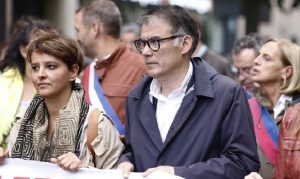30-06-2024
PARIS: France’s lightning-quick election campaign is over, and despite last-ditch appeals not to back the far right, voters appear ready to hand the National Rally party a historic victory in parliamentary elections.
Prime Minister Gabriel Attal warned it would unleash “impulses of hate and aggression” but the party of Marine Le Pen and 28-year old Jordan Bardella, who could be the next prime minister, has if anything cemented its lead in the opinion polls.
 National Rally has fended off a series of accusations of racism, involving party members as much as supporters. The big question now is whether it can win an absolute majority in two rounds over the next two Sundays.
National Rally has fended off a series of accusations of racism, involving party members as much as supporters. The big question now is whether it can win an absolute majority in two rounds over the next two Sundays.
They have a significant chance, after European elections on 9 June turned most of the electoral map of France dark blue. That was the moment Emmanuel Macron chose to stun the French people with a decision to call a general election in just three weeks.
National Rally (RN) is gearing up for a big night on Sunday, with one opinion poll hours before the campaign ended showing support at 36.5%.
Its candidates are hoping to win dozens of seats in the National Assembly outright on the night, with more than 50% of the vote but most seats will be decided in run-off votes on 7 July, between two, three or even four contenders.
So opinion polls do not tell the whole story, and a hastily arranged left-wing alliance, the New Popular Front, also has its eye on victory, only a few points behind RN with 29%.
The Ensemble alliance, led by Gabriel Attal, lies in third on 20.5%, according to the Ifop poll. He argues both the other main blocs are extreme.
No area of mainland France backed National Rally in the European vote more than L’Aisne, a rural department in the north with just over 50% support.
Since 2022, L’Aisne has already had three RN MPs, and in the historic town of Villers-Cotterêts, they have had a National Rally mayor, Franck Briffaut, for a decade.
 A party veteran of more than 40 years, going back to its old National Front days under Jean-Marie Le Pen, he feels the path to power has been inevitable, in the same way that Giorgia Meloni won elections in Italy but like many in his party, he won’t settle for anything less than an absolute majority in the National Assembly, which would require at least 289 of the 577 parliamentary seats.
A party veteran of more than 40 years, going back to its old National Front days under Jean-Marie Le Pen, he feels the path to power has been inevitable, in the same way that Giorgia Meloni won elections in Italy but like many in his party, he won’t settle for anything less than an absolute majority in the National Assembly, which would require at least 289 of the 577 parliamentary seats.
“I won’t be part of it, because it’s a trap set by Macron. I’m also convinced that if we get an absolute majority, he has to be made to leave. As long as he’s there, we can’t put through the entirety of our program. Because we need changes to the constitution.”
President Macron has promised he is not going anywhere until his term ends in 2027, and it is his task to appoint the next prime minister after the second round of these elections on 7 July.
Jordan Bardella, whose campaign posters have “prime minister” written underneath his name, insists he won’t settle for less than an absolute majority.
That does leave open the question of who Macron will choose if RN falls short. “There’s no point in Emmanuel Macron naming a prime minister nobody would want,” says constitutional expert Prof Dominique Rousseau but if there’s no absolute majority, he says the president has room to manoeuvre.
It would usually come from the biggest party, but if they refused, he could look for a consensus figure instead, who could pull together what remains of the centre right and centre left. (Int’l News Desk)
 Pressmediaofindia
Pressmediaofindia




